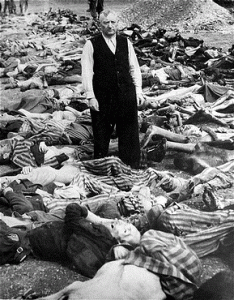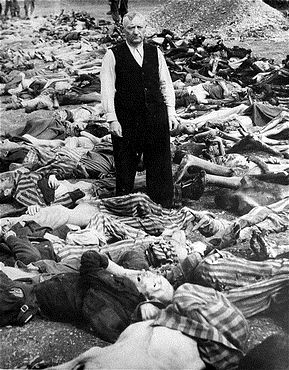I recently had the pleasure of re-watching HBO’s Band of Brothers as I introduced Heather to it for the first time. Unlike most other historical media I consume (or re-consume), I won’t be writing a general review for this miniseries. Band of Brothers is beloved and much talked about, and I frankly have nothing new to add to the conversation. While watching, however, I noticed something odd. In the final two episodes lurked a cognitive and thematic dissonance that, given recent trends in American and world politics, was thrown into higher relief than on other viewings.

The penultimate episode of Band of Brothers, “Why We Fight,” sees the men of Easy Company finally moving into Germany itself. As they occupy the small town of Landsberg, a patrol in the nearby woods discovers a Jewish concentration camp, abandoned by its guards ahead of the advancing Americans. The episode is filled with pathos and reminders for the men that there was indeed some higher reason why they are fighting in Europe, so far from their comfortable lives half a world away. One of the more refreshing plot points of the episode involves Easy Company’s reactions to the denials of Landsberg’s citizens that they had any idea the camp existed. The men will have none of it; the town’s inhabitants are forced to visit the camp and take part in burial details before repairing their ruined town without any help from the Americans. The message is clear: through their failure to speak up and their willingness to remain comfortably ignorant, every German civilian present (and perhaps period?) was complicit in the Nazi regime’s crimes against humanity.
This brings us to Band of Brothers’ finale, “Points,” wherein Easy Company deals with the aftermath of VE day and the end of the war. Here, the narrative of the previous episode is flipped on its head. Now that the fighting’s over and the German army beaten, the men begin to take a reconciliationist view of their enemy reminiscent of the sentiments that saw North and South obscure their previous animosity following the American Civil War. When Easy receives the surrender of an entire German army, the German general is allowed to keep his sidearm in a show of solidarity between soldiers, and his honorable farewell speech to his men is translated (by a Jewish-American soldier, no less!) with reverence as American officers look on. Later in the episode, we even see Americans jovially exchanging banter with German soldiers as they staff highway checkpoints together. While that same Jewish-American soldier does hunt down and execute a former camp commandant later in the episode, the targeted nature of this encounter makes the other, more general, comradeship stand out all the more. Only an episode ago, German civilians were condemned for their complicity; now, actual German soldiers are worthy of respect and comradeship based only on the shared brotherhood of military men.
The narrative themes of both these episodes, on their own and without historical context, are fairly common and unobjectionable. Back-to-back and in the Second World War, however, gives one cause for alarm. I think it’s safe to say that Nazi Germany tops the list of most reviled historical regimes in modern history, and I shouldn’t even need to say “with good reason.” Indeed, our public consciousness most often recoils simply from touching the Nazis, and throughout much of Europe (including Germany), Nazi memorabilia and apologism are explicitly banned. To see this trend reversed, even in part, in such a popular series is unsettling, to say the least, particularly as we see a visible resurgence of white supremacy and Nazism at home and abroad (and the inability of leading politicians to score so simple a win as denouncing them). I, and likely most others, thought that our memory of the Second World War would remain in a simpler, more black-and-white realm apart from such messy legacies as the American Civil War. Perhaps not, though a couple episodes of a decade-old TV show should not admittedly be a clarion call to arms. Whatever the case, only time will tell which direction the curve of memory will bend next.
